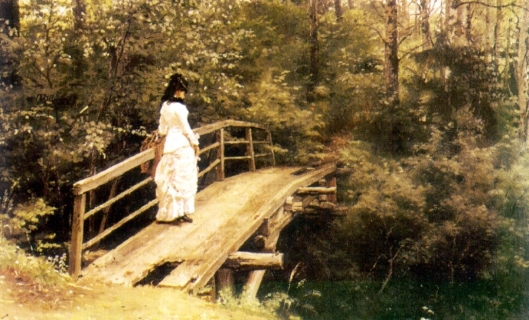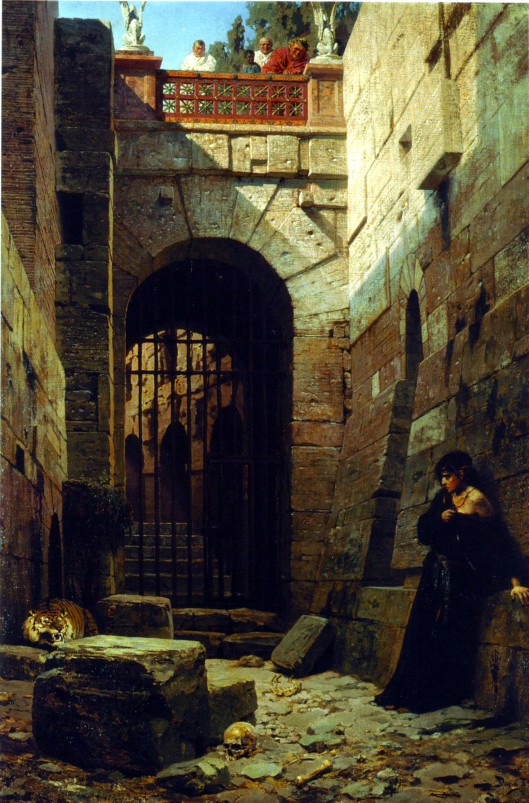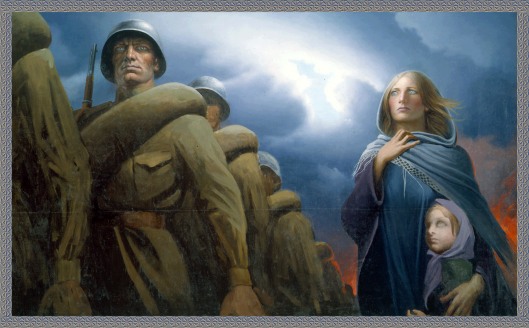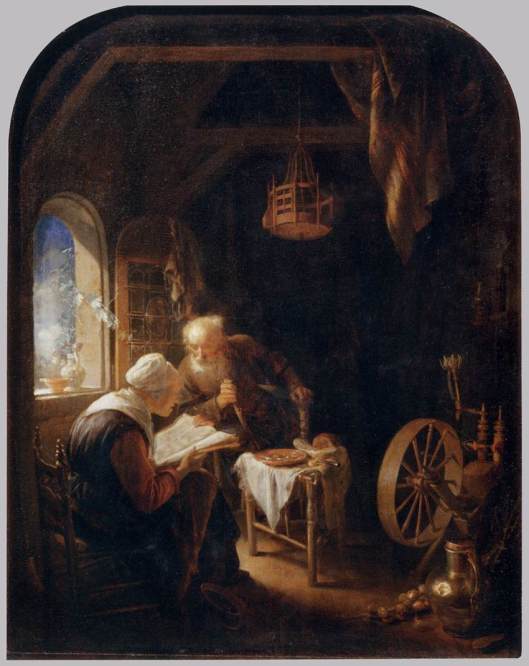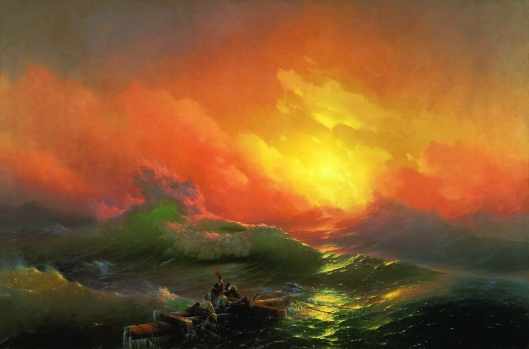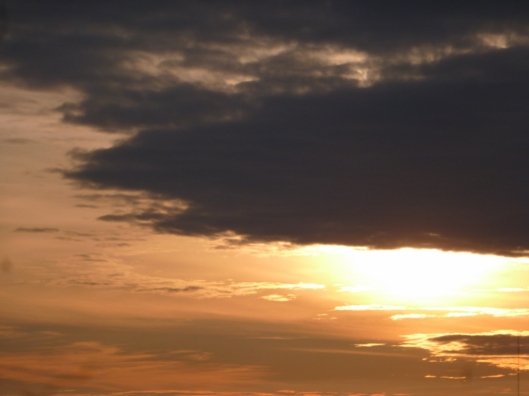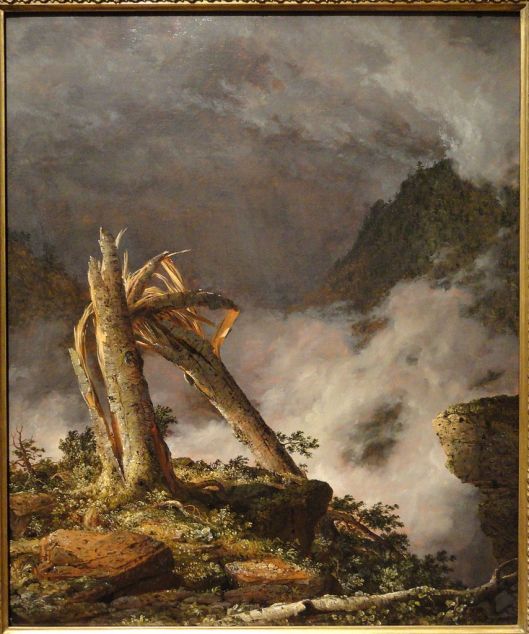
image via wikiart
I slept, and as I slept, I dreamed.
It was a terrible dream. Somewhere in a wasteland, as I suppose it could be called, I was walking slowly, stumbling over the scree as I was descending into a wide valley in the early morning light. The sun was almost hidden in the haziness, though I could tell that it was red and threatening even through the strange, ominous fogginess that made it difficult to perceive anything at any distance. The darkness in the valley was vaguely relieved here and there by strange, flickering lights of many colors. I could not tell what they were, but I only got a sense of dread for having noticed them, dim though they were.
And it was silent. Very silent. But what struck me most vigorously was the stench, the reek, the smell of dead and rotting corpses at several stages of decomposition. Human or animal or both – I could not tell. Utterly revolted, I kept walking, hoping to somehow escape the wrenching odor. I wondered if perhaps I should have turned to begin going back up the hill, but I kept on going downward, as I felt a strange draw to continue down into the valley.
I was focused on my footing, for it was treacherous. Clearly a path, it wound back and forth on account of the steepness of the bare side of the mountain. In the glowing haze of the red dawn, I thought I could distinguish some clumps of trees or boulders a little ways off from the walkway in which I found myself. But I continued stumbling on, sick at body from the stench, sick at heart from the dread. It was neither hot nor cold, with neither breeze nor roaring wind to bring some relief to the stillness. I kept on going.
Suddenly, a sound came drifting softly through the mist and I heard it – from where it came, I know not – the chilling notes of some sort of pipe. No real tune, no real rhythm, just wandering notes. I stood stock still as soon as I distinguished it, for I had heard such music once before – and it was not in a place I wished to remember. There it had been dark and chilly and very bitter, unlike this unknown place, though it was similar, somehow.
Then I saw something move. Further down the slope, not far from me, there was a human figure scrambling upwards; by his motions, he was apparently not using the path I was on, but making his way on hands and knees up the steep hillside. The strange music continued, not loudly, but chilling to my heart all the same. It was as though I was frozen in place, watching this person come towards me. I wished desperately to wake and be out of this place, but my dreaming continued on.
Terrible. It was a terrible dream, I said. For so it was.
As this person drew near to me, I could see that he was half-dead, wounded and maimed – but the expression on his face was worst of all. For when he, in reaching for his next foothold, looked up and saw me standing there, the reek of death all around, he paused and smiled – but it was with a searching evil in his eyes, bright with hate. And just then the tuneless music was silenced, and it was very still.
“What are you doing here?”
I was startled by his question more than by his raspy voice.
“I do not know,” I found myself answering as honestly as I could. “Truly, I do not know. It seems to me as if I have been here before, but things are very different from what I remember.”
“You have been here.”
“How do you know?” I couldn’t keep from asking, though I was growing sicker by the moment in the stench.
He only smiled broadly – in which I found no comfort – and he crawled nearer.
Suddenly, I heard something behind me. I couldn’t quite make it out, but it sounded massive – that was all could tell. I glanced briefly at the red morning sun, still low on the horizon, but illuminating the fog so that it seemed the very air was glimmering with dread. In all my surroundings, the red-hued sun alone held no terror for me; rather, it seemed a comfort, for the Lord is often figured as light to his people – and he is – even in their dreams. And I realized I was praying, for I was confounded and frightened.
The rumbling behind me grew louder and the very ground began to tremble. I felt as if someone was restraining me, keeping me from turning around to look behind me up the mountainside. So I looked straight ahead, as the man crouched on the steep hillside, half-glaring, half-laughing at me, but watching me closely as a cottonmouth watches his prey before he strikes. I most certainly felt a stranger in this reeking, still valley. And I waited, as the man was evidently doing, as well.
Then the murmur and massive rustling drew abreast of me and I could see what was happening. Apparently, a huge mass of every variety of people and beasts were descending the hillside, as if a great army was coming in to take possession of this already dead valley. I say it was dead, for so it seemed and smelled, but the ongoing flickering lights gave it an appearance of somehow being alive, in some sort of horrible way. The army of creatures were lost in the haze beyond my view to the left and to the right, but they were clearly intent on where they were going, some looking anxious, some looking listless, some looking angry, some of them even with their eyes closed, none of them, of man or beast, seeming to see me, but going on and on down the mountain slope. For the first time, I heard the shrieks of the hawks and saw the buzzards and eagles flying all together in dark masses above them. I hadn’t realized that the flesh-eating birds were missing from this terrible place until now. Dreams are odd, you know.
Even though I had kicked up scree as I had been walking earlier, this huge army didn’t stir up a stone. Clambering over boulder and barren hillside alike, the huge mass parted around where I was standing and, as it began to come back together on the other side, I saw them also part around the wounded man clinging to the rocks below, marching on in their silence. I still felt constrained and unable to move. The only sounds were the birds and the rumbling of the movement of so many creatures at once – until a sudden outburst of extremely loud noise began beating behind me – or was it behind me? I do not truly know. I suppose someone would call it music, beating, beating, beating – and there was a rhythm, fast, furious, focused – it was bitter to me and so loud that all I could hear – or, rather, feel – was the incessant rhythm beating upon me. If there were words, I know not. There very well may have been. It was most certainly a song of some sort. Instead of resonating within me, as songs often do, you know, it drove me to praying again, lest I lose my mind, my sanity, my self-awareness, even.
And then, even through the midst of it all, I thought I heard the tuneless piping that I had heard earlier, though much louder and more shrill and harsh. The thought came to me – though it seemed it must simply have been my imagination at work – that the screaming rhythm accompanying this vast army was in some sort of invisible battle with the lonely and hateful tuneless music which had come with the maimed individual – who was now just a little ways from me. It was all quite mind-numbing and I closed my eyes, for I was quivering, sick from the stench, unable to move or to shake the sense of some great conflict around me in which I had no part. Again, I wished to wake from this dream. But I slept on; and as I slept, I continued to dream.
The red sun suddenly shone through the fog and I felt the heat of it on me and opened my eyes. The noise increased. A wind stirred up from somewhere and, if possible, the odor of death increased. The huge crowd still rushing around me hastened their pace, though I remained untouched. I saw that the man had drawn closer to me and that the mass of creatures was continuing to part around him, as well – and now I was able to see that, for many of them, person and beast alike, fear stirred in their hopeless eyes as they approached him and hurried by with quickened strides. The hot rising sun was breaking up the heavy, glowing fog, but the valley was still deep in mist, the strange lights still scattered here and there.
“Look!”
I do not know how I heard his grating voice amid the din, but I did, and tried to see where he was pointing with one of his two remaining fingers. The constraining hand upon me was lighter now, so, with difficulty, I slowly turned around to look up the slope, my back now to the red sun. There was a light – a clear light as of the sun on a lovely day – coming over the top of the mountain like a tidal wave, vast and broad, as far along the ridge as I could see.
“Your brothers.”
He spat at me, having drawn now so close in the midst of the passing armies that we were within the same small clear space among their droves.
“Your brothers,” he repeated. “They come to look on us.”
I drew my eyes from the beautiful light above me for a moment in order to look at him. But I recoiled from the bitter hate that I saw in the eyes of the creature as he said,
“You belong to us. You are like us. You are dead. But he – but he,” and his voice was quivering with rage, “– he said you shall no longer be dying! How many has he robbed us of! And doubtless there shall be more!”
Flinging his gaze up the hill at those whom he had called my brothers – who could now be seen cresting the top, a great army, indeed, each one clothed in light itself, as it were – I saw him quail, though defiant yet, while a couple of his wounds broke open again in his agitation. I was horrified at his rage, for in seeing this army walking in light a hope had returned to my failing heart. Though I found no sympathy whatsoever upon his vitriolic hatred, I was stirred with a little pity, even so, dead and dying as he was. By now seeming to have forgotten about me entirely, though he was so close he could have reached out and touched me, he spun around to look at the red sun, which was fast rising higher and higher above the roaring noise – noise as if all Sheol was fighting among itself. Raising his misshapen fist toward the sun, he cursed and cursed such curses as I wish never, never to hear again.
In the midst of this, as the last ranks of the massive herd of creatures parted around me and passed on down into the hazy valley behind me, I heard something familiar, even over the cursings of the dead man beside me; yes, and it was a very beautiful sound, indeed. It was a victory song – I knew it well. Its pleasing tones drowned out the raging noises that had been buffeting me; and all my fear fled at its coming. At the same time I heard the lilting strains, I caught a whiff of a pleasant aroma that scattered the scent of death even as the dew so quickly disappears from before the hot summer’s dawn. My strength was renewed and I found I had already joined in the singing without thinking on it. The constraint was entirely lifted from me and I lifted up my feet to run towards the advancing army whose well-known and well-loved banner I could see floating on the morning breeze blowing in from the sea. For, suddenly, I knew where I was and I knew what day it was.
It was the Sabbath morning. It was the day when all flesh gathers to worship the Lord and when all the sons of God, the redeemed of the Lord, go forth together to look on the flesh of the dead, from whence we all have been drawn, those miserable ones whose worm does not die and whose fire is not quenched.
And I awoke, at last. I quickly arose and went to the window, where I looked out upon a clear morning sun rising over the trees into a cloudless sky and I began to sing the song I had heard in my dream. The Sabbath day was here. Hallelujah. Amen.
Isaiah 66:22-24

